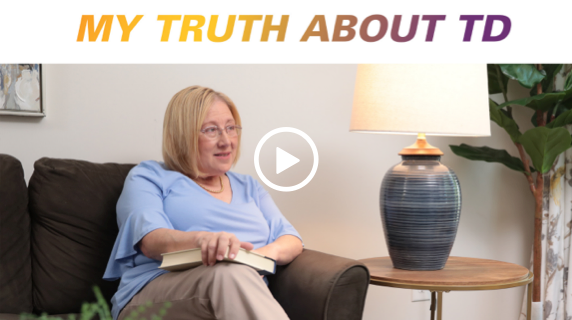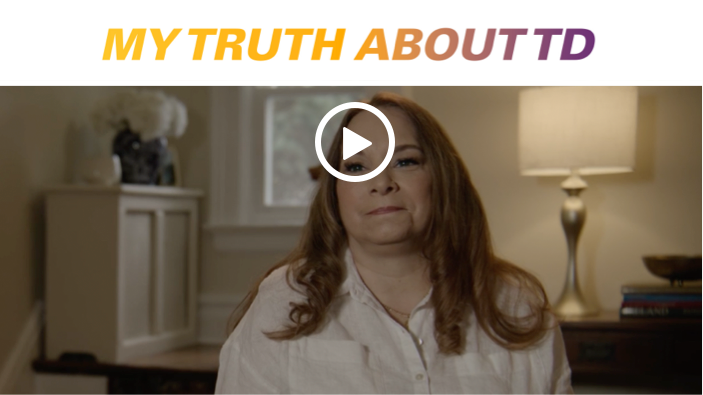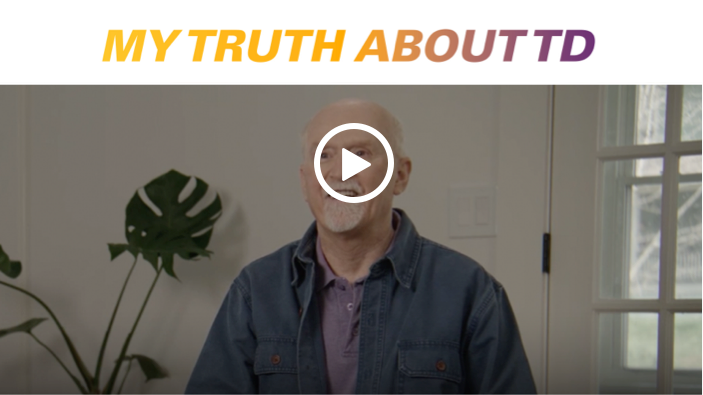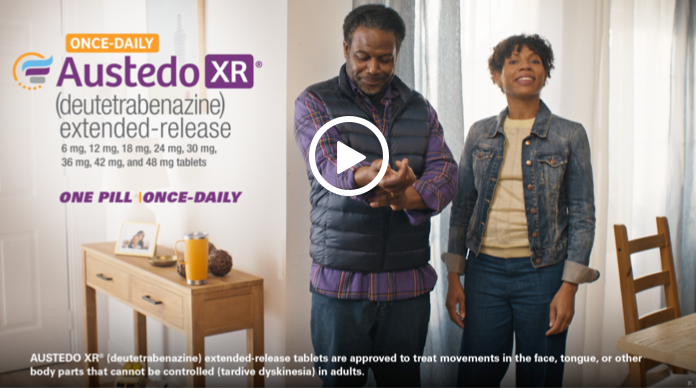tardive dyskinesia (td) videos
Hear what people with TD and professionals have to say about TD
and their experiences with AUSTEDO® (deutetrabenazine) tablets.
Now Playing:
Susan's story
Susan shares her experience about realizing her uncontrollable movements were TD and recognizing the impact they were having on her life. View her full story or select a specific milestone from the chapters in the dropdown menu.
View transcript
Becoming Aware of TD
Titration Benefits
Reaching Your Dose
Meet Rachel
TD symptoms & diagnosis
Starting TD treatment
On the path to diagnosis
TD treatment and my medications
Getting back to life
Meet Joe
Receiving a diagnosis
Starting TD treatment
View transcript
Strangely enough, I did not recognize it. My daughter, who lived with me at the time—it was two of us living together. She said, “Mom, stop doing that. It’s bothering me.” And I said, “Doing what?”
She said, “That thing with your tongue and your lips.”
A couple years later, I was a peer support specialist, which is a mental health professional, and got a new supervisor who was a psychologist, and she said, “You know, you could do something about that TD, Tardive Dyskinesia.” And then, I put two and two together.
My doctor told me that the medication was something that he was comfortable with…that it was a medication we’d have to titrate up, which means starting a medication at a lower dose and build up.
If you’re not familiar with titration, sometimes medications have to slowly be introduced into your system.
You’re gradually putting more and more medication into your system until you hit the value that your provider wants you to have.
Once I reached the correct dosage for me, I felt I reached a goal.
I don’t see the mouth tics the way I used to.
I can be out in the public—I do a lot of public speaking.
I’m involved greatly in things like art groups and karate group.
Now that my involuntary movements are under control, it makes it a lot easier to be involved in things that I want to be in my control.
AUSTEDO XR is a prescription medicine used to treat tardive dyskinesia in adults.
AUSTEDO XR can cause depression, suicidal thoughts, or actions in patients with Huntington’s disease. Pay close attention to and call your doctor if you become depressed, have sudden changes in mood, or have suicidal thoughts. Don’t take if you have liver problems, are taking reserpine, tetrabenazine, or valbenazine. AUSTEDO XR may cause irregular or fast heartbeat, or abnormal movements. Seek help for fever, stiff muscles, problems thinking, or sweating. Common side effects include inflammation of the nose and throat, insomnia and sleepiness.
APPROVED USES
AUSTEDO XR® (deutetrabenazine) extended-release tablets and AUSTEDO® (deutetrabenazine) tablets are prescription medicines that are used to treat:
the involuntary movements (chorea) of Huntington’s disease. AUSTEDO XR and AUSTEDO do not cure the cause of the involuntary movements, and it does not treat other symptoms of Huntington’s disease, such as problems with thinking or emotions.
movements in the face, tongue, or other body parts that cannot be controlled (tardive dyskinesia).
It is not known if AUSTEDO XR and AUSTEDO are safe and effective in children.
IMPORTANT SAFETY INFORMATION
AUSTEDO XR and AUSTEDO can cause serious side effects in people with Huntington’s disease, including: depression, suicidal thoughts, or suicidal actions. Do not start taking AUSTEDO XR or AUSTEDO if you are depressed (have untreated depression or depression that is not well controlled by medicine) or have suicidal thoughts. Pay close attention to any changes, especially sudden changes, in mood, behaviors, thoughts or feelings. This is especially important when AUSTEDO XR or AUSTEDO is started and when the dose is changed. Call your healthcare provider right away if you become depressed, have unusual changes in mood or behavior, or have thoughts of suicide.
Individual results may vary.
Please see the Important Safety Information at the end of this video.
Once my involuntary movements were under control, I felt like I can live again. I can go outside again. I can be a part of the world again.
“Hello, my name is Sherland. I’m from Roxboro, North Carolina. I’m a published author. I edit novels. I am a great lover of literature and nature.”
Dear Sherland,
When this first started, you weren’t aware that something was wrong…until your daughter asked you why you were so fidgety. She told you that your mouth twitched when you talked and your fingers and feet constantly moved. When you realized you couldn’t control these movements, you grew self-conscious. TD transformed you from someone who loved conversing with strangers, to a timid individual who avoided family and friends because everyone asked when you had a stroke, not if you had a stroke, but when […]. TD left you feeling despondent and lonely.
My doctors told me that my involuntary movements…were side effects caused by my mental health medication. When I first found out that I had Tardive Dyskinesia, I did as much research as I could about it. It felt good to know that I had a name to put with what I was experiencing. And I felt like I wasn’t alone because other people were going through the same thing. The doctor told me when he recommended AUSTEDO, ‘I’ve heard of this treatment that I think might help you.’ AUSTEDO has allowed me to continue taking my mental health medication, because it’s really important. I suffer from major depression and bipolar. Before, I was just feeling hopeless. And after about two or three weeks, I just started getting back out there because I had something to look forward to. I started seeing real progress with the involuntary movements. I have to say that it really made a difference in my life. I have confidence. I would tell them that there is a treatment, and it’s called AUSTEDO. And that you don’t have to feel hopeless like I did. You don’t have to struggle like I did. You can go to your doctor. You have a name, TD, to put with the symptoms. Ask about AUSTEDO and be proactive with your own health, because if you are not, then who else will be? There’s no guarantees in life—but I feel like this is a good treatment plan for me.
Hi, I'm Rachel. I'm a grandma and a mother. When I was 18, I was diagnosed with schizophrenia. I really didn't have a big, base for, you know, people in my family that understood about schizophrenia and knew about schizophrenia. I just knew that I was sick, and I would spend months in the hospital, and it just went on for years. I went to the doctor, and she prescribed me medication and the medication that she prescribed me, I was on for like, 16 years. I ended up getting drug induced tardive dyskinesia. I didn't know from taking a medication that I could get a disease.
I went to the doctor, and I pleaded with her. I told her, please listen to me. Something's going on with me. My hands are shaking. You know, at that point, my hands were like this. My head was bobbling around like this. I lost the feeling in my legs. My legs wouldn't hold my body anymore, and it just got so bad. I noticed it first in my hand and then and then I started getting very upset when it started going to my face. My tongue was like this. All day, my tongue just kept sticking out of my mouth, sticking out of my mouth. For the longest time, I didn't want to go outside. I was too ashamed to go outside. I was too ashamed to talk to people and be around people because of the movements. They were so embarrassing. That really hurt my feelings was the cruel, cruelness people had towards me, with making fun of me. They had problems with me. Why are you talking like that? You sound drunk. Why? Why is your tongue sticking out? Why are you walking like that? And then they sent me to another doctor. And he noticed that I had the tardive dyskinesia. When I was diagnosed with the tardive dyskinesia, I was devastated. It finally gave a name to something that I didn't know that could possibly happen to me from taking medication that I was prescribed.
When I started taking the AUSTEDO, I started noticing first my hands started smoothing out where they weren't tapping so much. My fingers weren't tapping so much, and then they started just going straight. They just leveled out. Then I noticed that my mouth movements, my tongue started to stay in my mouth more. My doctor was able to find the right dosage for me of the…the XR. The AUSTEDO XR reduced my movements. AUSTEDO lessened my movements so much, that I was just stunned and…and I couldn't believe it. It made me feel so wonderful. It made me feel fulfilled. It made me feel…it made me feel that there's…there's hope.
With the relief from AUSTEDO that I get, I can now play with my grandkids. I can make bracelets with my beadwork. I can do my woodwork. I can go and play with my kids. I can go for walks now. With less TD movements, I'm able to do more things now. It just took everything and turned it around and made me be able to be alongside of people again. Now I can hold my own cup. I can brush my teeth. I can clean the house. I can drive again. I can do things that I couldn't do. The AUSTEDO XR has made a difference in my life because it's allowed me to cope without shaking around. My hands and my face and my legs. It's important to know about my story because there's so many people out there that have it and they're ashamed. You know, TD is not your fault. You can do something about it like I did. You can ask your doctor for medication. I would tell somebody that had uncontrollable movements to go and get checked out for tardive dyskinesia to see if they need to have AUSTEDO XR for their medications. And now, now, because of the AUSTEDO, I'm…I'm back…back, I'm back, baby, I'm back.
AUSTEDO XR is a prescription medicine used to treat tardive dyskinesia in adults. AUSTEDO XR can cause depression, suicidal thoughts, or actions in patients with Huntington's disease. Pay close attention to and call your doctor if you become depressed, have sudden changes in mood, or have suicidal thoughts. Don't take if you have liver problems, are taking reserpine, tetrabenazine, or valbenazine. AUSTEDO XR may cause irregular or fast heartbeat, or abnormal movements. Seek help for fever, stiff muscles, problems thinking, or sweating. Common side effects include inflammation of the nose and throat, insomnia, and sleepiness.
APPROVED USES
AUSTEDO XR® (deutetrabenazine) extended-release tablets and AUSTEDO® (deutetrabenazine) tablets are prescription medicines that are used to treat:
the involuntary movements (chorea) of Huntington’s disease. AUSTEDO XR and AUSTEDO do not cure the cause of the involuntary movements, and it does not treat other symptoms of Huntington’s disease, such as problems with thinking or emotions.
movements in the face, tongue, or other body parts that cannot be controlled (tardive dyskinesia).
It is not known if AUSTEDO XR and AUSTEDO are safe and effective in children.
IMPORTANT SAFETY INFORMATION
AUSTEDO XR and AUSTEDO can cause serious side effects in people with Huntington’s disease, including: depression, suicidal thoughts, or suicidal actions. Do not start taking AUSTEDO XR or AUSTEDO if you are depressed (have untreated depression or depression that is not well controlled by medicine) or have suicidal thoughts. Pay close attention to any changes, especially sudden changes, in mood, behaviors, thoughts or feelings. This is especially important when AUSTEDO XR or AUSTEDO is started and when the dose is changed. Call your healthcare provider right away if you become depressed, have unusual changes in mood or behavior, or have thoughts of suicide.
Individual results may vary.
Please see the Important Safety Information at the end of this video.
Rebecca Allen: I mostly remember feeling movements in my face, but not until it was brought to my attention…but when somebody had mentioned I was making movements in my face, I did realize it and became very conscious of it.
Rebecca Allen: Hi, my name’s Rebecca and I’m from Scranton, Pennsylvania.
Dr Jesse: I’m Dr Jane Jesse. I’m a psychiatrist in Pennsylvania. I’ve worked with Rebecca now for the last six years.
Rebecca Allen: When I first met Dr Jesse and Dr Jesse had told me about tardive dyskinesia, I had no knowledge of that condition.
Dr Jesse: When I first met Rebecca, I noticed that she had movements in her face and in her hands. She did complain about the shakiness in her hands. But she also had some jaw-clenching movements within her face, and after that, realizing what medications she’d been on in the past, I realized that what we were dealing with was Tardive Dyskinesia.
Rebecca Allen: I noticed that I was having difficulty doing simple things like preparing food, using a knife, counting change, buttoning, zippering clothing. Those things became more challenging. The movements in my hands, I could not keep my hands still. So, I had difficulty, even if I tried consciously.
Dr Jesse: Oftentimes I find myself I’m the one asking them about their movements first. And they’ll say, “Nobody’s ever asked me about this.” My rule of thumb when I treat patients is that I treat them like I'd want my friends or my family treated, and so I’d speak with the patients about tardive dyskinesia, and then I offer treatment.
Rebecca Allen: Dr Jesse told me there was a medication that could help me with these involuntary movements I was experiencing and I was willing to try it. And I am very happy that I did because I did see improvement.
Dr Jesse: In the beginning, I was not convinced. I was thinking it was going to be yet another medication…and then I saw the difference. AUSTEDO helped Rebecca in a number of different body areas. I saw a lot of the shakiness in the hands just sort of calm down.
Rebecca Allen: Once I started treatment with AUSTEDO, I did notice that the tasks weren’t as difficult as they were before. I did notice that I felt less movement and I was very happy with the results. Now I'm able to actually function at a higher level. I was able to return to the workforce and I'm feeling as though I'm accomplishing something.
Dr Jesse: I’ve seen improvement in Rebecca’s abnormal movements after she’s been on AUSTEDO.
Rebecca Allen: If you have a uneasy feeling, you should bring it to your doctor’s attention because I’m glad I did and I’ve seen improvement.
Dr Jesse: If a patient is seeing this video and they’re uncertain if they’ve got tardive dyskinesia, they should definitely talk to their healthcare provider about it. If they don’t get enough information or the right answer, then to keep looking for another doctor who takes their story seriously.
My name is Denise Gallops. I'm a family nurse practitioner. TD never became even a topic until my primary care physician pointed it out to me. By this time, it'd been about four years that I've been having movements. Then when I found out that TD was being caused by one of my medications, it made me think about whether or not I actually wanted to continue taking that medication.
But I had already been through so many other medications that that was the only one that was really starting to really control any part of my bipolar disorder and get me out of mania, because my mania would last for weeks and I would go days without sleep. So it became more than just a struggle of taking the medication every day, getting better.
It's do I want to really try another medication or continue on the path that's taken me through 7 or 8 other different medications already. So which was more important, my mental health or the TD? Getting the diagnosis of TD was more of a relief, because I knew that I had been mistreated the whole time and misdiagnosed for so long that when somebody said, you actually have TD, it was like, maybe we can start over and actually get some treatment that works.
Now that my mental health is taken care of AUSTEDO XR meant more to me because not only was my mental health my main priority with TD, but now I can then be treated for TD while maintaining my mental health.
I'm on five different mental health medications to control my disorders. I didn't have to alter any of them. When talking to other providers about AUSTEDO and AUSTEDO XR, drug interactions are a big discussion. However, with AUSTEDO, that's not a big deal because maintaining mental health is difficult enough as it is without having to change the regimen.
So taking AUSTEDO XR as a one daily dose has made it more simple for me, because then I can just take it before I go to bed at night. So for people who are very active and have time management crunches, it is better for them like me, because I work a 12 hour day, so it's easier for me just to take it once and done.
Communication as a nurse practitioner is essential. It's part of everyday life. So after starting AUSTEDO XR, my mouth movements had changed enough the way that my speech was back to normal and I was no longer hiding and withdrawing from my patients. I could start talking to them again and get back on that personable level. And my patients noticed.
The biggest difference is taking AUSTEDO is my mouth movements. My speech is returned to normal. I'm able to eat and drink without any difficulty. I can brush my teeth again. My feet don't get tripped up on the stools at work because I sit on a stool a lot of times when I talk to patients because I don't like standing over patients, and just my hands, they're not near as bad as they were, and I can type again and my handwriting has return to normal.
So as my improvement came with my movements, I was able to walk the dogs again and take them down the steps without worrying about being pulled down the steps because my feet wouldn't cooperate with me.
AUSTEDO XR is a prescription medicine used to treat Tardive Dyskinesia in adults. Austedo XR can cause depression, suicidal thoughts, or actions in patients with Huntington's disease.
Pay close attention to and call your doctor if you become depressed, have sudden changes in mood or have suicidal thoughts. Don't take if you have liver problems, are taking reserpine, tetrabenazine, or valbenazine. AUSTEDO XR may cause irregular or fast heartbeat or abnormal movements. Seek help for fever, stiff muscles, problems thinking or sweating. Common side effects include inflammation of the nose and throat, insomnia, and sleepiness.
My name is Joe. I was diagnosed with bipolar back in 2008. I suffered from depression before that. And then they put me on medication for the depression. Sometimes I would just stay in bed or just hide out in the house and wouldn't do anything.
I started having mouth movements that were uncontrollable. I would be like I was talking, but I wasn’t saying anything. My mouth would just move by itself. Whenever I'm sitting with somebody new and I have my mouth is moving, I tell them that I have TD to explain to them, so they understand why my mouth is moving and I'm not talking. And I went almost a year that way before I saw a movement disorder doctor. It was a culmination of moments that caused me to go to my doctor’s to get checked. The biggest part was the biting on the inside of my mouth. Sometimes when my mouth gets going, I can't sleep. And so, it was keeping me awake at night, too. I knew I had to do something, and I didn't know what it was at the time.
My doctor was able to tell me it was TD. As soon as I sat down with him and he saw my mouth move, he knew right away that it was TD. It’s a movement disorder. Your body has uncontrolled movements. Some people, it affects their hands, so they have a tendency of dropping things. Fortunately, mine is just my mouth. The doctor told me I was identified with TD. I went *sigh*. It was a major relief because it was like...so, I finally know what’s wrong with me.
The doctor prescribed AUSTEDO for me. AUSTEDO was done in a regimen. You start off and then you increase to the doses that you need. After about a month, the movements lessened. People around me did see the difference. After taking AUSTEDO, I noticed that my mouth wasn't moving as much, and so the AUSTEDO has allowed me to not have that problem. And it just makes you be able to go live a normal life without having to deal with the mouth movements. The extended release has made a big difference in my life. It’s much easier taking the pill once a day rather than having to take it twice a day. The AUSTEDO XR is a time-released medication that affects and treats the movements of the disorder. I found the AUSTEDO XR to relieve that on a daily basis and give me relief from the discomfort that it causes. I would recommend that if you go on the AUSTEDO, to take the extended release. Without it, I wouldn't…I wouldn't be the same. I wouldn't be able to function every day without the AUSTEDO. TD may change your life, but AUSTEDO can help make it better.
AUSTEDO XR is a prescription medicine used to treat tardive dyskinesia in adults. AUSTEDO XR can cause depression, suicidal thoughts or actions in patients with Huntington's disease. Pay close attention to and call your doctor if you become depressed, have sudden changes in mood, or have suicidal thoughts. Don't take if you have liver problems, are taking reserpine, tetrabenazine, or valbenazine. AUSTEDO XR may cause irregular or fast heartbeat or abnormal movements. Seek help for fever, stiff muscles, problems thinking, or sweating. Common side effects include inflammation of the nose and throat, insomnia, and sleepiness.
AUSTEDO XR® (deutetrabenazine) extended-release tablets and AUSTEDO® (deutetrabenazine) tablets are prescription medicines that are used to treat adults with movements in the face, tongue, or other body parts that cannot be controlled (tardive dyskinesia).
IMPORTANT SAFETY INFORMATION
AUSTEDO XR and AUSTEDO can cause serious side effects in people with Huntington’s disease, including: depression, suicidal thoughts, or suicidal actions. Do not start taking AUSTEDO XR or AUSTEDO if you are depressed (have untreated depression or depression that is not well controlled by medicine) or have suicidal thoughts. Pay close attention to any changes, especially sudden changes, in mood, behaviors, thoughts or feelings. This is especially important when AUSTEDO XR or AUSTEDO is started and when the dose is changed. Call your healthcare provider right away if you become depressed, have unusual changes in mood or behavior, or have thoughts of suicide.
Individual results may vary.
Please see the Important Safety Information at the end of this video.
Living with bipolar disorder was exhausting…I had rapid cycling and so I really didn’t know from one day to the next, what my day was gonna be like…
It took a long time to come to the right medications…And when I say a long time, years…it’s much better now…
…When I first started having the movements and they got more severe...I went to my initial doctor... he said that it was side effects of other medications that I was on...
I actually thought I had restless leg syndrome because I couldn’t quit moving my legs.
…And at one point, I even moved out of our bedroom. I took the guest bed because I couldn’t quit twitching at night…I had to put my foot over the side of the bed to shake it, because I just couldn’t quit…It was horrible.
…I had a lot of blinking…it was like a full facial squint. And…sometimes I would have to hold it for seconds at a time. I twisted my mouth and then I also had…probably fairly often, this rocking thing that I had to do. I had to rock all the time…
Then it actually got worse. It went to this hip thrusting thing and that was when everybody else started noticing. And it was embarrassing. The whole family suffered, it wasn’t just me…it affected everybody.
…My son was in from Atlanta and so I took the three boys out to breakfast. And we were at a restaurant and the booth shared the seat with the booth behind it. And I was rocking and swaying…And there was nothing that I could do about it. And the lady behind us asked me to stop.
…I was afraid to tell even my family…how severe it affected me…They could see the physical things. No matter what I tried to do,…I could not pull this together. I almost had to quit my job. …I rocked and swayed and then I was so self-conscious of having to talk to people. My anxiety was off the chart and…I came really close to having to just not be able to do anything.
When my symptoms were kind of at the worst, my sister said that this is unacceptable, but she gave me an overview of what my life looked like to her and to what everybody else was seeing, that I really wasn’t letting myself think about. And, you know, the thing that she said was that…”This is an unacceptable way to live, but let’s get it figured out.”
AUSTEDO XR® (deutetrabenazine) extended-release tablets and AUSTEDO® (deutetrabenazine) tablets are prescription medicines that are used to treat adults with movements in the face, tongue, or other body parts that cannot be controlled (tardive dyskinesia).
IMPORTANT SAFETY INFORMATION
AUSTEDO XR and AUSTEDO can cause serious side effects in people with Huntington’s disease, including: depression, suicidal thoughts, or suicidal actions. Do not start taking AUSTEDO XR or AUSTEDO if you are depressed (have untreated depression or depression that is not well controlled by medicine) or have suicidal thoughts. Pay close attention to any changes, especially sudden changes, in mood, behaviors, thoughts or feelings. This is especially important when AUSTEDO XR or AUSTEDO is started and when the dose is changed. Call your healthcare provider right away if you become depressed, have unusual changes in mood or behavior, or have thoughts of suicide.
Individual results may vary.
Please see the Important Safety Information at the end of this video.
So about the time that I…actually got diagnosed…with TD…my symptoms included a lot of facial twitches. I had a lot of blinking…it was like a full facial squint. And…sometimes I would have to hold it for seconds at a time. I twisted my mouth and then I also had…probably fairly often, this rocking thing that I had to do. I had to rock all the time.
…When I first saw my doctor…he zoned in right away on my…facial…twitches. And he asked me if I knew about it. And I said, “Yes.” And…he started asking me to do some things to take like some…physical tests…
…He evaluated the movements in my mouth and I know my tongue, and…with my fingers, and…some other things like that. But…it was…really comforting to know that he had a checklist. Like, he spotted this in me, he asked me about it, he took in what I had to say and then he had a checklist of things…that he just checked off. I mean, that may sound weird, but honestly, that was very comforting to me.
…and he said that I have tardive dyskinesia.
I was…unsure what that meant for me and how…if it progressed what that was gonna look like. But, you know, I trusted him because first of all, he’s the first person that said, “This is something.”
…Sometimes when you can put a name on something, and identify it, then it gives you hope that if you know what it is, that’s the first step to fixing it. We had several more appointments and, um, he started educating me about exactly what it is, and…how he can treat it…What stuck out in my mind was that it’s progressive and if you don’t treat it, you’re not gonna get better.
…It was great to know that this was…a disease and that there was treatment. But at the same time, I had to have a little time to sit with that to decide that I was gonna take a chance and try to make it better.
…When my doctor started talking to me about AUSTEDO, it wasn’t just about ‘Okay, here’s a medication that I think can help,’ it was really about, ‘I see what’s happening to you and let me walk you though this. Let me hold your hand through this.’ And that was the turning point for me.
AUSTEDO XR® (deutetrabenazine) extended-release tablets and AUSTEDO® (deutetrabenazine) tablets are prescription medicines that are used to treat adults with movements in the face, tongue, or other body parts that cannot be controlled (tardive dyskinesia).
IMPORTANT SAFETY INFORMATION
AUSTEDO XR and AUSTEDO can cause serious side effects in people with Huntington’s disease, including: depression, suicidal thoughts, or suicidal actions. Do not start taking AUSTEDO XR or AUSTEDO if you are depressed (have untreated depression or depression that is not well controlled by medicine) or have suicidal thoughts. Pay close attention to any changes, especially sudden changes, in mood, behaviors, thoughts or feelings. This is especially important when AUSTEDO XR or AUSTEDO is started and when the dose is changed. Call your healthcare provider right away if you become depressed, have unusual changes in mood or behavior, or have thoughts of suicide.
Individual results may vary.
Please see the Important Safety Information at the end of this video.
…When my doctor was telling me the benefits of AUSTEDO…He was very reassuring…And…we would spend a lot of time talking about what my symptoms really were, how much they affected me. And in talking through that with him, I became, more comfortable to talk about what I was exactly having and …to know that, you know, he was experienced with this and to trust that…there was…something out there that could be beneficial to me. And he shared that with me in such a way that I could trust him and was ready to try it.
…He felt like it would…treat the symptoms that I was having…that it would have little interaction with any medicines that I was already on. Within the first thirty days, I definitely had noticed a change.
…Now that my movements are being managed, I am able to do some of the things that I love…every day.
…One of our things that we did all the time…is go out to eat. We love to go out to eat….we’ll do, like a dive one week, or…we’ll go get dressed up and go someplace really fancy and, you know, all these things…I don’t have to worry about being able to do that at all anymore. I’m not self-conscious about that. I love to go.
These are the things that, you know, are kind of our favorite things to do as a couple…that we have always done together, that I’m now able to do again. It’s not just like, I’m able to go and I hope nobody notices or I’ll go for him because he wants to go. It’s…something that, you know, I enjoy again, and we have fun at.
So if I could share with someone that was having some involuntary movements like I was…I would share with them to talk to their doctor and be very honest and…be very open with what is going on…you may have to have that conversation several times, you may have to have that conversation several different ways, but…don’t give up and follow…what’s really right for you and your body and how…out of whack that might seem for you. Some people, you know, it might not be until it gets really severe that they think, “Okay, I, I, you know, this is happening to me and I really need to reach out.”
AUSTEDO XR® (deutetrabenazine) extended-release tablets and AUSTEDO® (deutetrabenazine) tablets are prescription medicines that are used to treat adults with movements in the face, tongue, or other body parts that cannot be controlled (tardive dyskinesia).
IMPORTANT SAFETY INFORMATION
AUSTEDO XR and AUSTEDO can cause serious side effects in people with Huntington’s disease, including: depression, suicidal thoughts, or suicidal actions. Do not start taking AUSTEDO XR or AUSTEDO if you are depressed (have untreated depression or depression that is not well controlled by medicine) or have suicidal thoughts. Pay close attention to any changes, especially sudden changes, in mood, behaviors, thoughts or feelings. This is especially important when AUSTEDO XR or AUSTEDO is started and when the dose is changed. Call your healthcare provider right away if you become depressed, have unusual changes in mood or behavior, or have thoughts of suicide.
Individual results may vary.
Please see the Important Safety Information at the end of this video.
So, Tardive Dyskinesia is an abnormal involuntary movement, which can look like twitching, jerky, or simply the person just simply looking antsy.
…When patients come in with what looks like tardive dyskinesia, they tend to report the impact of these movements in three different ways. One can be obviously physical. Two can be how it impacts their day-to-day activities. And number three, how it impacts their social interactions. About one in four patients who’s treated with antipsychotics develops tardive dyskinesia...
And now that we’re treating a much larger population of patients with second generation antipsychotics, it’s important to be aware of that. The way the tardive dyskinesia impacts people varies greatly.
…There’s almost this general sense that people don’t necessarily want to take notice of the fact that they’re having a particular movement. And oftentimes, either a family friend, or a family member, or an acquaintance will actually point out the movement, and that’ll cause embarrassment. So, patients have these involuntary movements, they can’t suppress them. They can’t stop them. And those movements can be anywhere in the body.
…My patients talk to me about how…tardive dyskinesia affects them and that they’ll tell me that, you know, sometimes it can cause embarrassment. …sometimes they socially isolate which means that they don’t wanna go out. Some people are quite dismissive of it because perhaps in the past they’ve been told that they couldn’t do anything about it. Now, they’re just thinking, well, I’ve gotta live with this. That’s changed. And that’s a very important message for people to be aware of.
AUSTEDO XR® (deutetrabenazine) extended-release tablets and AUSTEDO® (deutetrabenazine) tablets are prescription medicines that are used to treat adults with movements in the face, tongue, or other body parts that cannot be controlled (tardive dyskinesia).
IMPORTANT SAFETY INFORMATION
AUSTEDO XR and AUSTEDO can cause serious side effects in people with Huntington’s disease, including: depression, suicidal thoughts, or suicidal actions. Do not start taking AUSTEDO XR or AUSTEDO if you are depressed (have untreated depression or depression that is not well controlled by medicine) or have suicidal thoughts. Pay close attention to any changes, especially sudden changes, in mood, behaviors, thoughts or feelings. This is especially important when AUSTEDO XR or AUSTEDO is started and when the dose is changed. Call your healthcare provider right away if you become depressed, have unusual changes in mood or behavior, or have thoughts of suicide.
Individual results may vary.
Please see the Important Safety Information at the end of this video.
When diagnosing the patient with Tardive Dyskinesia, we’ll do a history and physical. So we’ll do a past medical history, do you have any history of, major depression, bipolar disorder, gastroparesis or, you know, diabetes, and then what medications have you been put on? Have you been put on any medicines that block dopamine?
We look at how many years they’ve been exposed to antipsychotics. We look at how old they are, what was their baseline psychiatric illness? All of the factors which would be risk factors for developing tardive dyskinesia, we gauge that…many times they’ll say that they’re restless. They can’t sit still. They just don’t feel comfortable in their skin. They’re always moving around. When they’re trying to fall asleep, they’re always sort of going back and forth. Their legs are always moving. Uh, and so they just sort of feel restless. Um, and so many times the family members will just say, “Gosh, they’re just kind of twitchy all the time. You know? They’re always twitching and, and jerking and that sort of thing.”
…Primarily it affects the face and the mouth area, but can affect anything with, um, any, any muscle in your body. Primarily, your upper extremities like your hands. Um, it can affect your lower extremities like your feet, and it can affect your torso and up into your neck. Once we’ve got a good solid history, which is pointing towards tardive dyskinesia, we do a physical exam. And many practitioners simply examine the patient to look for abnormal movements. But there are also scales available, which are validated for us to gauge for the severity of tardive dyskinesia.
…I examine the patient using the abnormal involuntary movement scale, uh, where I rate them as a series of seven areas that I look at and rate them from zero being no movement, to four being very severe movement. And then I total that up, and that gives the score.
…Somebody might have minimal or mild symptoms according to a scale like the abnormal involuntary movements scale…but that could be highly disabling for that individual. If it’s affecting their interpersonal life, their occupation, their domestic setting, it’s oftentimes going to evoke embarrassment and avoidance.
Now what is important for patients to understand is, it does not matter to your provider what the final tally score is. What matters is, how disabling it is for the patient.
…When people’s quality of life goes down, it’s like you and I, we want as solid of an experience of life as we can, can possibly can. And I believe in the golden rule. So, you know, when you place yourself in someone else’s shoes and you see what’s happening with them based on the fact that they have a clinical diagnosis of something, it’s important to let them know that they can do something about that.
We know that from both statistics and from surveys, that it can be…physically…disabling. So why would you leave a disorder as such untreated, which can potentially impact the person in multiple ways? There’s a great degree of heterogeneity, which means variability among people, but it’s kind of nice knowing that we have agents that can help us with a really bad problem that we’ve lived with for many years without really having a solution for it. Before, uh, you know, we would treat patients with antipsychotics and we’d say that you have the possibility of having involuntary movements as a part of this treatment. And in the past, we would always say, well we have to just live with it. .... Today, we don’t have to make that trade off. We can treat the involuntary movements, or the tardive dyskinesia, should they arise.
…When someone suspects that they’ve got a problem, the best move is always seeking out one’s doctor, if that doctor knows what they’re doing, even if they don’t know what’s going on, they’re gonna seek out a second opinion or seek out a movement disorder specialist or somebody that they know clearly feels comfortable diagnosing and treating individuals with involuntary movements. So I’d say that’s a first step, seeking out the appropriate attention and help and then maybe being led down the path of finding the right medicine for them.
AUSTEDO XR® (deutetrabenazine) extended-release tablets and AUSTEDO® (deutetrabenazine) tablets are prescription medicines that are used to treat adults with movements in the face, tongue, or other body parts that cannot be controlled (tardive dyskinesia).
IMPORTANT SAFETY INFORMATION
AUSTEDO XR and AUSTEDO can cause serious side effects in people with Huntington’s disease, including: depression, suicidal thoughts, or suicidal actions. Do not start taking AUSTEDO XR or AUSTEDO if you are depressed (have untreated depression or depression that is not well controlled by medicine) or have suicidal thoughts. Pay close attention to any changes, especially sudden changes, in mood, behaviors, thoughts or feelings. This is especially important when AUSTEDO XR or AUSTEDO is started and when the dose is changed. Call your healthcare provider right away if you become depressed, have unusual changes in mood or behavior, or have thoughts of suicide.
Individual results may vary.
Please see the Important Safety Information at the end of this video.
…When talking to my patients about AUSTEDO, I tell them that this is a option of prescribed medication that can be given for Tardive Dyskinesia, that can be used in combination with their antipsychotic medications so that I can treat both their mental health condition, as well as their tardive dyskinesia.
Well, we like to say is that, because it’s gone through an FDA approval for the specific diagnosis, it means there are multiple trials which are being done to make sure that this drug is efficacious, meaning effective in suppressing the symptoms of tardive dyskinesia. … Of course, in the trials we also saw some patients did not have a great response, or no response to treatment and that happens with all medications. And also there were side effects noted in the trial. Most common side effects include inflammation of your nose and also disturbances in sleep patterns.
…In the clinical studies, patients had a three‐point reduction in their AIMS score…Uh, and you could see benefits as early as two weeks but usually saw them by 12 weeks.
When you take a look at the results of the clinical trials, they were actually quite nice in really seeing significant differences for individuals in reducing that movement burden…knowing that we can initiate someone with this medicine, get them to the right fit for them with again, this flexible approach that then helps us along the lines of being able to counter these movements that they’re having.
…The nice thing about AUSTEDO is that we have a large flexibility in dosing. We can go anywhere in between depending on what the patient's needs are at that time. so, it's nice and gives us a lot of flexibility in dosing. And we can titrate as needed depending on the patient’s symptoms.
So one of the biggest fears patients have is that their psychiatry regimen, which has been keeping them stable all along, will be changed. But what we saw in the trials was that these patients could continue on their current psychiatric medication regimen, along with the addition of AUSTEDO.
The beauty about AUSTEDO is that it allows us an opportunity to keep the background medicines going so that if we’ve got solid control with a mood or a psychotic condition, we don’t have to alter what we’re doing with them and we’re treating the movement problem separately.
AUSTEDO XR® (deutetrabenazine) extended-release tablets and AUSTEDO® (deutetrabenazine) tablets are prescription medicines that are used to treat adults with movements in the face, tongue, or other body parts that cannot be controlled (tardive dyskinesia).
IMPORTANT SAFETY INFORMATION
AUSTEDO XR and AUSTEDO can cause serious side effects in people with Huntington’s disease, including: depression, suicidal thoughts, or suicidal actions. Do not start taking AUSTEDO XR or AUSTEDO if you are depressed (have untreated depression or depression that is not well controlled by medicine) or have suicidal thoughts. Pay close attention to any changes, especially sudden changes, in mood, behaviors, thoughts or feelings. This is especially important when AUSTEDO XR or AUSTEDO is started and when the dose is changed. Call your healthcare provider right away if you become depressed, have unusual changes in mood or behavior, or have thoughts of suicide.
Individual results may vary.
Please see the Important Safety Information at the end of this video.
AUSTEDO is a medication that can treat Tardive Dyskinesia in adults…it’s a tablet that you take twice a day…before we start patients on AUSTEDO, uh, we go over their medication list, so both their prescription drugs, their over-the-counter drugs, any vitamins, supplements they’re on, and any herbal medications they’re taking.
Tardive dyskinesia affects different individuals in different ways. So the overall results may vary greatly from one person to another. As with any treatment, with the use of AUSTEDO, some people may experience side effects, and some people may not necessarily reap benefits associated with the use of the medicine…But when you take a look at the results of the clinical trials, they were actually quite nice in really seeing significant differences for individuals in reducing that movement burden.
Educating patients about what to expect with AUSTEDO, as it correlates with whatever condition it is that we’re treating for them, it’s really an important topic. When they know that they don’t have to compromise with maybe getting worse with whatever it is that we’ve been treating, but, in fact, now also have a remedy for their movement problem, people oftentimes, feel a sense of relief. They oftentimes speak of, again, a sense of feeling like a weight’s been lifted off of them that they didn’t think would be lifted from them previously. So it’s really gratifying being able to let people know that we have treatments that can help.
Encouraging patients to continue on with their treatment with AUSTEDO to address their tardive dyskinesia is a very important point. We always wanna reinforce in our patients to comply or to take their medicines as they’re suggested to be taken. That doesn’t always happen. So it’s really important to reinforce that if someone stops taking a medicine like AUSTEDO, we may well lose ground in that those movements may actually come back.
The way that I encourage patients to stay on the medication is, um, you know, I make it meaningful for them. I find what symptom it has, or what is been improved for them, and ask them, to continue that stability, that they need to continue, on this medication.
Teva as a company offers resources to help patients start and continue their medication.
Hey mom, your mouth and eyes are doing that thing again.
Not again.
Let’s talk to your doctor.
We learned the uncontrollable movements are called tardive dyskinesia, or TD, and were caused by mom’s mental health medications.
Mom was prescribed AUSTEDO XR—a once-daily extended-release pill for adults.
AUSTEDO XR can significantly reduce TD movements, with some seeing a response as early as 2 weeks.
And, mom can stay on her mental health medications.
AUSTEDO XR can cause depression, suicidal thoughts, or actions in patients with Huntington’s disease. Pay close attention to and call your doctor if you become depressed, have sudden changes in mood, or have suicidal thoughts. Don’t take if you have liver problems, are taking reserpine, tetrabenazine, or valbenazine. AUSTEDO XR may cause irregular or fast heartbeat, or abnormal movements. Seek help for fever, stiff muscles, problems thinking, or sweating. Common side effects include inflammation of the nose and throat, insomnia and sleepiness.
If you see TD, ask about AUSTEDO XR.
Honey, your mouth and eyes are moving again.
Really?
Yeah, let’s go talk to your doctor.
We learned the uncontrollable movements are called tardive dyskinesia, or TD, and were caused by Derrick’s mental health medications.
Derrick was prescribed AUSTEDO XR—a once-daily extended-release pill for adults.
AUSTEDO XR can significantly reduce TD movements, with some seeing a response as early as 2 weeks.
And, he can stay on his mental health medications.
AUSTEDO XR can cause depression, suicidal thoughts, or actions in patients with Huntington’s disease. Pay close attention to and call your doctor if you become depressed, have sudden changes in mood, or have suicidal thoughts. Don’t take if you have liver problems, are taking reserpine, tetrabenazine, or valbenazine. AUSTEDO XR may cause irregular or fast heartbeat, or abnormal movements. Seek help for fever, stiff muscles, problems thinking, or sweating. Common side effects include inflammation of the nose and throat, insomnia and sleepiness.
If you see TD, ask about AUSTEDO XR.
APPROVED USES
AUSTEDO XR® (deutetrabenazine) extended-release tablets and AUSTEDO® (deutetrabenazine) tablets are prescription medicines that are used to treat:
the involuntary movements (chorea) of Huntington’s disease. AUSTEDO XR and AUSTEDO do not cure the cause of the involuntary movements, and it does not treat other symptoms of Huntington’s disease, such as problems with thinking or emotions.
movements in the face, tongue, or other body parts that cannot be controlled (tardive dyskinesia).
It is not known if AUSTEDO XR and AUSTEDO are safe and effective in children.
IMPORTANT SAFETY INFORMATION
AUSTEDO XR and AUSTEDO can cause serious side effects in people with Huntington’s disease, including: depression, suicidal thoughts, or suicidal actions. Do not start taking AUSTEDO XR or AUSTEDO if you are depressed (have untreated depression or depression that is not well controlled by medicine) or have suicidal thoughts. Pay close attention to any changes, especially sudden changes, in mood, behaviors, thoughts or feelings. This is especially important when AUSTEDO XR or AUSTEDO is started and when the dose is changed. Call your healthcare provider right away if you become depressed, have unusual changes in mood or behavior, or have thoughts of suicide.
Do not take AUSTEDO XR or AUSTEDO if you:
have Huntington’s disease and are depressed or have thoughts of suicide.
have liver problems.
are taking reserpine. Do not take medicines that contain reserpine with AUSTEDO XR or AUSTEDO. If your healthcare provider plans to switch you from taking reserpine to AUSTEDO XR or AUSTEDO, you must wait at least 20 days after your last dose of reserpine before you start taking AUSTEDO XR or AUSTEDO.
are taking a monoamine oxidase inhibitor (MAOI) medicine. Do not take an MAOI within 14 days after you stop taking AUSTEDO XR or AUSTEDO. Do not start AUSTEDO XR or AUSTEDO if you stopped taking an MAOI in the last 14 days. Ask your healthcare provider or pharmacist if you are not sure.
are taking tetrabenazine. If your healthcare provider plans to switch you from tetrabenazine to AUSTEDO XR or AUSTEDO, take your first dose of AUSTEDO XR or AUSTEDO on the day after your last dose of tetrabenazine.
are taking valbenazine.
Other possible serious side effects include:
Irregular heartbeat (QT prolongation). AUSTEDO XR and AUSTEDO increases your chance of having certain changes in the electrical activity in your heart. These changes can lead to a dangerous abnormal heartbeat. Taking AUSTEDO XR or AUSTEDO with certain medicines may increase this chance.
Neuroleptic Malignant Syndrome. Call your healthcare provider right away and go to the nearest emergency room if you develop these signs and symptoms that do not have another obvious cause: high fever, stiff muscles, problems thinking, very fast or uneven heartbeat, or increased sweating.
Restlessness. You may get a condition where you feel a strong urge to move. This is called akathisia.
Parkinsonism. Symptoms include: slight shaking, body stiffness, trouble moving, trouble keeping your balance, or falls.
Sleepiness (sedation) is a common side effect of AUSTEDO XR and AUSTEDO. While taking AUSTEDO XR or AUSTEDO, do not drive a car or operate dangerous machinery until you know how AUSTEDO XR or AUSTEDO affects you. Drinking alcohol and taking other drugs that may also cause sleepiness while you are taking AUSTEDO XR or AUSTEDO may increase any sleepiness caused by AUSTEDO XR and AUSTEDO.
The most common side effects of AUSTEDO in people with Huntington’s disease include sleepiness (sedation), diarrhea, tiredness, and dry mouth.
The most common side effects of AUSTEDO in people with tardive dyskinesia include inflammation of the nose and throat (nasopharyngitis) and problems sleeping (insomnia).
The most common side effects of AUSTEDO XR are expected to be similar to AUSTEDO in people with Huntington’s disease or tardive dyskinesia.
These are not all the possible side effects of AUSTEDO XR or AUSTEDO. Call your doctor for medical advice about side effects. You are encouraged to report side effects of prescription drugs to the FDA. Visit www.fda.gov/medwatch or call 1-800-FDA-1088
Please read the accompanying Medication Guide.
Perspectives from people living with TD
Sherland's story

Rachel's story
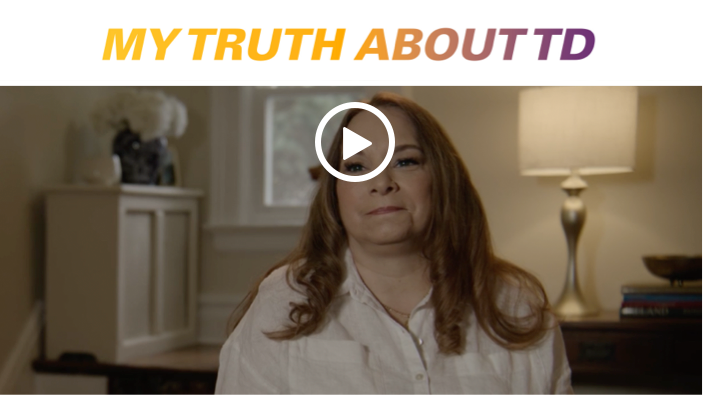
Rebecca's story with Dr Jesse

Denise's story

Joe's story
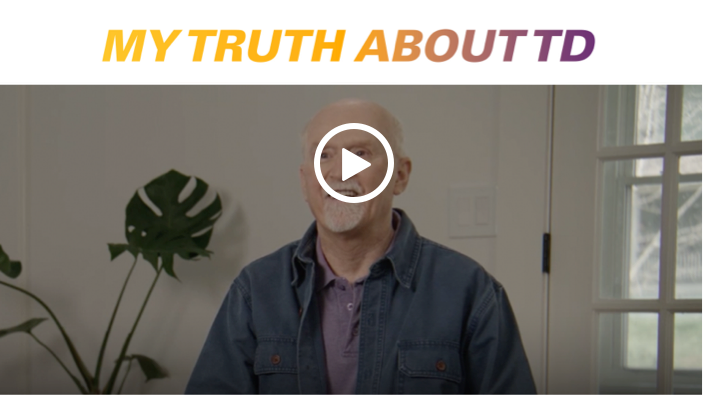
The impact of Tardive
Dyskinesia (TD)

My Tardive Dyskinesia (TD)
diagnosis story

Treating Tardive Dyskinesia (TD)
with
AUSTEDO

Professional insights
The impact of
Tardive Dyskinesia (TD)

How to diagnose
Tardive Dyskinesia (TD)

AUSTEDO: A treatment
for Tardive
Dyskinesia (TD)

What to expect
with AUSTEDO

As you go with AUSTEDO
Meet Stephanie and Claire

Meet Derrick and Lisa
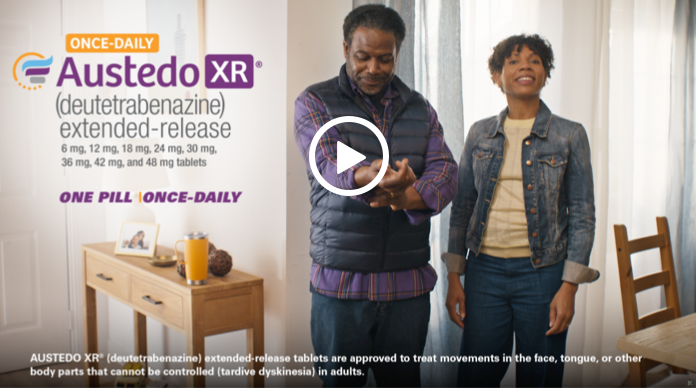

Are you a healthcare professional?
The information on this site is intended for healthcare professionals in the United States. Are you a healthcare professional in the United States?
